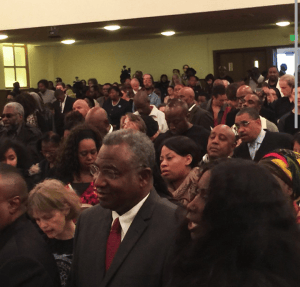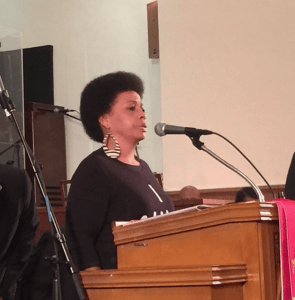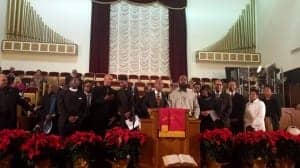by Kia Croom
Nearly 800 community members, public officials, faith and thought leaders packed the pews of Third Baptist Church on Sunday to hear remarks from Mike Brown Sr., father of the 18-year-old shot and killed by a Ferguson police officer. The event comes amid a storm of local protests decrying police brutality that have gained national attention.

A somber Brown had little to say, but expressed gratitude to attendees for their support.
“I’m tired. But I’ll sleep when it’s over. Enough is enough. We’ve got to stand strong and fight,” Brown said before taking his seat.
The audience wildly applauded. Cries and groans were heard throughout the sanctuary from community members overcome with grief and sorrow from recent events – some grieving their own loved ones lost to gun violence.
Following Brown’s brief address, Pastor Amos Brown of Third Baptist Church took up a “love offering,” requesting donations from the attendees – 100 percent of which would go to the Brown family for travel and other incidental expenses.
Brown’s address was a part of the multi-faith, multi-racial assembly organized by Christian leaders and the Nation of Islam to denounce the excessive force perpetrated by police and resulting in the recent deaths of Brown, Eric Gartner – and, closer to home, Oscar Grant and many more. The event ignited spirited discussions on the need for improved community-police relations in San Francisco and nationally.
“The police should be proportionately representative of the community they police and the image of the police needs to be changed,” said Pastor Brown. “It is time this city listen to these speakers who have come today presenting a work plan to put San Francisco in therapy so that she may be made whole,” he said.
Pastor Brown, Minister Christopher Muhammad of the Nation of Islam and other event conveners presented a plaque honoring former San Francisco Mayor Willie Brown for his efforts to improve relations between the police and broader community during his term. Although the former mayor was absent, faith leaders and audience members lauded his efforts.
“The police should be proportionately representative of the community they police and the image of the police needs to be changed,” said Pastor Brown.
“He (Willie Brown) made an effort to establish true community policing. He used the weight of his office to change a SFPD culture, and it was successful until he was termed out of office,” said Minister Muhammad.

The program included remarks from Mattie Scott, whose son, George C. Scott, was shot and killed in 1996. Scott gave an emotional address that moved attendees to their feet and many to tears.
Wearing a t-shirt that read, “I can’t breathe,” as an ode to Eric Gartner, Scott asked everyone in the church to stand who has lost a friend or loved one to gun violence. With nearly the entire audience standing, Scott issued one of the most heart-wrenching appeals of the evening.
“This is a national health epidemic and we need to do something about it. We shouldn’t have this many people standing because they’ve lost someone due to senseless gun violence,” she said.
The message was clear among the speakers and attendees that gun violence, whether at the hands of police or ordinary citizens is intolerable. Interestingly enough, on the heels of an event condemning violence and excessive force on part of the police, attendees agreed the agitation woven into the wave of national protests is key to effecting social change.
“This is a national health epidemic and we need to do something about it. We shouldn’t have this many people standing because they’ve lost someone due to senseless gun violence,” she said.
“To the protestors, thank you for being the disruption that you’ve been. Thank you for being the conscience we need,” District 10 Supervisor Malia Cohen shouted over thunderous applause and cheers from standing audience members.
When asked what he hoped rally attendees would take away from the event, Akbar Muhammad, international representative to Minister Louis Farrakhan replied:
“The demonstrations and the rallies must continue. It’s like an agitation you cannot stop. People say, what do you want? Well, there’s a lot that we want, but in order for us to negotiate what we want, we have to apply pressure.”
“To the protestors, thank you for being the disruption that you’ve been. Thank you for being the conscience we need,” District 10 Supervisor Malia Cohen shouted over thunderous applause and cheers from standing audience members.
In the midst of attendees’ tears, cheers and applause, relatives of O’Shaine Evans, the 26-year-old African American man shot and killed Oct. 7, 2014, by a San Francisco police officer, quietly recused themselves from the event visibly disaffected by the program and its overarching message.
Evans was a suspect in an automobile burglary when he was gunned down, after Officer David Goff says Evans pointed an unloaded .380 caliber gun at him forcing him to discharge his firearm. Goff fired seven shots at Evans, striking him twice.
Amid speculations Evans’ death could have been racially motivated, the police held a town hall meeting to defend their actions just days after the shooting. The Evans family was outraged that they were not notified of the meeting, as they had a number of questions for the police chief. Evans’ relatives attended the meeting only after hearing about it from a local radio station.
The Evans family’s questions stemmed from their discovery that Officer Goff was not in uniform at the time he approached Evans, but rather “plain-clothed” wearing a t-shirt.
“So it’s possible that someone in the nighttime would not be fully aware that this was a police officer following them,” said Massina Moore, a relative to Evans.

Moore said that the family planned to contact the NAACP for support, citing impropriety surrounding Evans’ death.
Cadine Williams, sister to Evans, and Angela Naggie, his mother, stood stoically on the steps of Third Baptist Church withstanding the brisk San Francisco winds.
“It’s very disappointing. Most of the focus is on Mike Brown Sr. and the people from the church. We along with other grieving families were told we’d have the opportunity to tell what happened to our loved ones,” said Williams.
Williams said she was offended when Pastor Brown requested an offering benefitting the Brown family and wished he would consider other local grieving families in need.
“We stand in solidarity with Ferguson, but there are families right here in San Francisco still going through ups and downs trying to pay their bills after having buried their child. I think that was very insensitive.
“Ferguson is right here in San Francisco. Our loved one didn’t make it in the news but not a day goes by I don’t miss my brother,” Williams said. “I see my mother constantly crying. Her baby is not coming home,” she said.
Contributing writer Kia Croom is a published journalist with 10 years of experience writing for publications in California and the Southeast. Follow her on Twitter @newsbykiac or email her at kianews2011@gmail.com.





